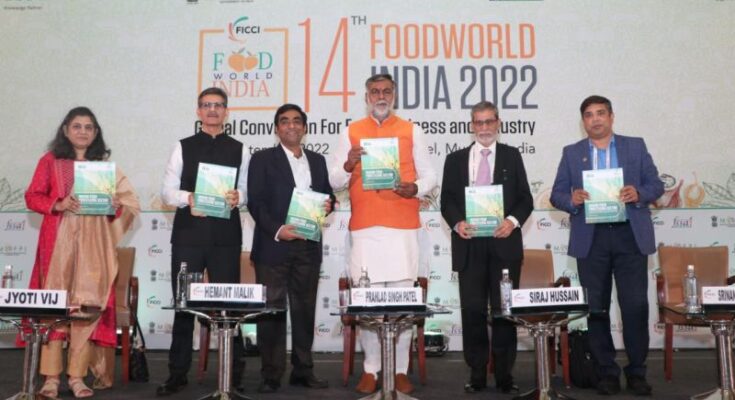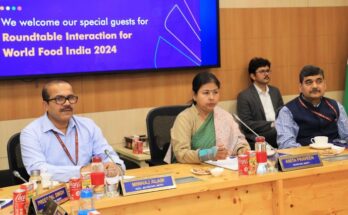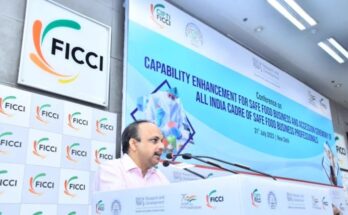Minister of State for Food Processing Industries (MoFPI), Govt of India, Prahlad Singh Patel, today said that the government is aware that Indian food processing, especially the unorganised sector has major women participation, and we are taking steps to make it an organised sector. “We need to increase the pace to achieve the set goals. This can be achieved with reduction of compliances, more communication with the government and the stakeholders, finding timely solutions to challenges,” he added.
Addressing the ‘14th FICCI Food World India – The Global Convention for Food Business & Industry’ in Mumbai, Patel asserted that there was a need to enhance the marketing and branding of the Indian food processing sector and products. “The government is fully committed to support the industry and find solutions to the problems,” he added. Patel stated that the government also needs to further simplify the existing schemes by removing the bottlenecks and industry will play a critical role in this. To boost the sector, he added that the government has already step-up incubation centres to support the industry and innovations, he noted.
You may also like to read: B2B food processing platform Suite42 Raises $4.3M Seed Round
The government, Patel said is taking continuous steps to improve the food processing sector including the introduction of PLI scheme for the sector. He further stressed on taking measures to not only cater to the domestic markets but also the global demand for processed foods.
The minister further added that the Indian food processing sector would be the backbone in achieving the US$5 trillion economy target. He stated that the focus of the government is to ensure reducing compliances to support the industry and the sector. “There is a need to further strengthen the trust in the consumers for processed foods and the government along with industry have to work towards it,” he added.
Siraj Hussain, Former Secretary, MoFPI, Govt of India said that the Indian food processing industry played an important role during Covid. He also stressed on improving and creating a market for the primary food processing market. “Unless we encourage the primary food processing market, we will not be able to establish a direct linkage of the food processing sector with the farmers,” he added. Hussain also highlighted that there is a need to develop new products in the food processing sector to solve India’s nutritional status.
You may also like to read: 3F Oil Palm to invest INR 250 Cr to set up integrated oil palm factory in Arunachal Pradesh
Hemant Mallik, Chair, FICCI Food Processing Committee & CEO- Food Division, ITC said that focus on innovation, digital adoption and nutrition are key mantras for the industry to succeed.
Srinandan Sundaram, Co-Chair, FICCI Food Process Committee & ED-F&R for HUL and VP-F&R for Unilever, South Asia said that Indian food processing is growing, and the industry is willing to work with the government to further improve the sector.
FICCI-BCG Knowledge report ‘Tapping India’s Food Processing Potential – A Call to Action’ was released during the event.
Key highlights of the report
The report lays out a 5-point action plan –‘A-R-I-S-E’- that can provide the food industry the necessary firepower to achieve its export potential.
- Adoption of crop value chains by establishing of crop-specific PPP model: To provide support to small farmers in addressing cost and quality-related challenges for the agri-produce.
- Reinvigorate promotion of Indian-origin brands globally: To enable the pooling of efforts/resources and allow for a consistent plus harmonised strategy for brand promotion.
- Institutionalise industry-academia collaboration to aid R&D: To facilitate technological advancement and new product development.
- Set up collaboration among private players for setting up and sharing infrastructure facilities: To enable sharing of setup costs involved and also leverage cost efficiency benefit from economies of scale.
- Establish sustainability and ethical norms and ensure compliance: To enable Indian food manufacturers in meeting the increasing demand for products that have been manufactured in compliance with sustainability and ethical norms
Since agricultural and allied industries form the backbone of the Indian economy, improving the gross value addition in the agricultural industry will be a key lever in improving the socio-economic conditions in the country. For this, it is imperative to not just focus on improving the agricultural produce, but also on improving the level of food processing and its export – especially higher processing.





